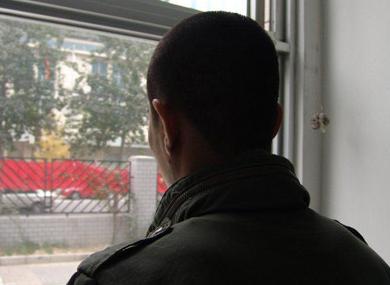
"Guys like me are aware of the risk of AIDS infection, but I just didn't expect it to visit me so fast," said Xiao Qiang (alias), who realized he was a homosexual when he was 16.
Learning his blood sample test turning out to be positive, the 23-year-old feels "the whole world is collapsing," and life is going down to complete darkness.
Xiao Qiang is the only child in his family in northeast China. He began to contact a circle of "comrades" (in Chinese, "comrade" is a nickname for gays and lesbians) in 2000, the second year after entering college. Two years afterwards, he got himself a gay mate. The two of them had an intimate relationship, but without sex. The first homosexual sex experience happened not long after his graduation.
This June, Xiao Qiang quit his job in his hometown and went to Beijing to seek his fortune. Not long after his arrival, however, he went to a medical institution for a free AIDS test. Though he had had an AIDS test every year from 2002 (apart from 2005), this year he drew the short straw.
"I wish I could make friends and live my life as usual, but I can't. The fact of being an HIV carrier keeps getting to me," he said.
Once he accidentally cut himself on a piece of glass and bled. It would not have been a big deal in the past but at the time Xiao Qiang had a strong sense of his blood as "filth."
In his mind, no one can live for another 10 years with the HIV virus and he's decided he'd rather choose to die if full-blown AIDS develops needing medical treatment.
He tried to conceal his disease from the people around him. This October, he joined a conference for an AIDS foundation project and lived in hotel for several days with a lot of people just like him.
Discovering that many HIV-infected look no different from average people, and with the help of medical treatment and maintenance many stay in good health for many years, Xiao Qiang regained some faith.
"If you go down with the disease, we will help and take care of you. But if you give up on yourself, nobody can help you." These words from friends he made at the conference warmed his heart.
From this turning point, Xiao Qiang took a more positive attitude, joining a volunteer organization to promote prevention of AIDS.
But sadness still came to visit him at times when he felt lonely in subway stations or parks with the crowds pouring past. He would be strongly aware that he was carrying the terrible virus which made him different from other people. He almost choked with such feeling.
Xiao Qiang revealed his infection to just three of his friends. He didn't expect them to hang out with him like in the past. All he wanted now was someone to whom he could talk; even a telephone call or online chatting was ok. But unexpectedly, some days after he told them the bad news, these friends came to visit him without any discomfort.
"To tell the truth, I'm feeling really lucky," said Xiao Qiang.
He still conceals the fact of being gay from his parents, fearing a look of disappointment in their eyes.
Like many single kids in urban families, he never thought about saving money for the future. He spent all he had and sometimes asked the parents for more.
"But now I have got to think about that. I will have a considerable sum of money to spend on my future medical treatment," he said.
Xiao Qiang has not been home since he discovered he was an HIV carrier. He wanted to go home, but didn't know how to face his parents.
His health is now good. But once he enters the medical treatment phase, he might suffer from opportunistic infections such as pneumonia and encephalitis as his immune system weakens.
"When an HIV-infected person comes to the later stage of medical treatment, which is very costly, no money means no life," he said sadly.
Xiao Qiang knows that he can't handle the cost of expensive medicine all by himself. Many of his friends suggest telling his parents the truth, the sooner the better. He agrees and is thinking of how to broach the subject.
"I think they can take this," said Xiao Qiang.
He is about to leave Beijing to take a job in another place, but plans to come back for a regular health check. As for what the future will hold, Xiao Qiang doesn't have a clue.
"I do hope our society can have a correct acknowledgement of AIDS patients," he said. It will be good if one day doctors and the average people can treat a HIV patient just the same way as they treat a patient who's got a cold, he added.
| 